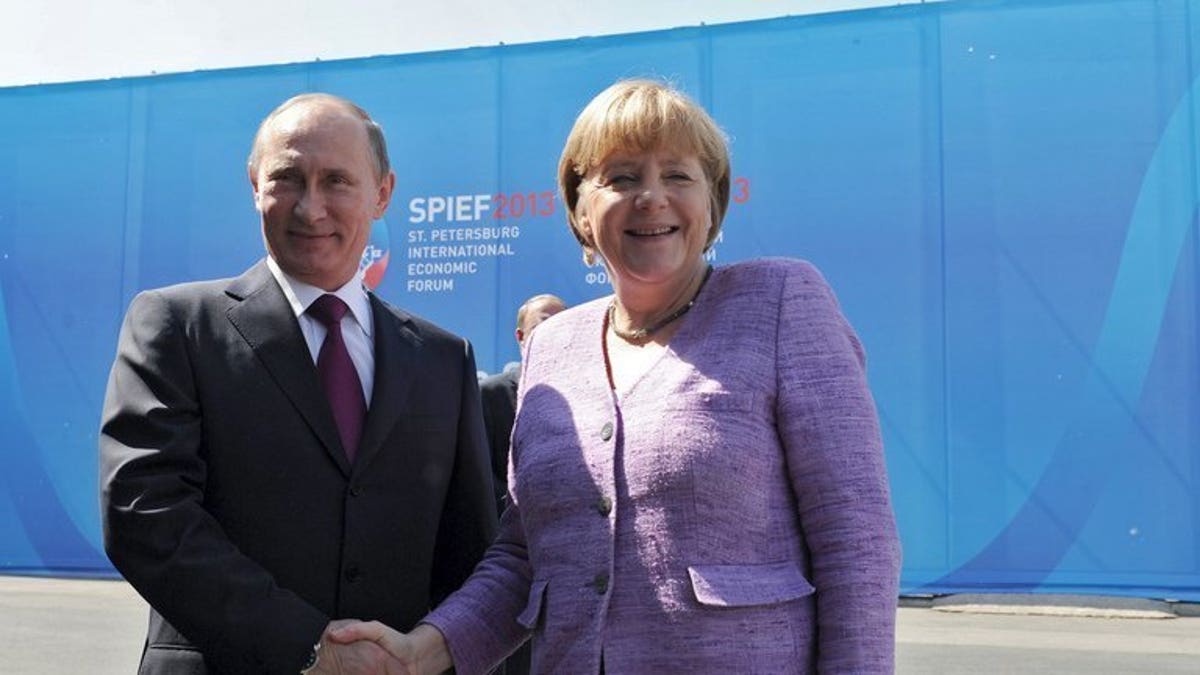
Russia's President Vladimir Putin (L) and Germany's Chancellor Angela Merkel meet during an International Economic Forum in St Petersburg, on June 21, 2013. Putin and Merkel on Friday announced that they would both attend the opening of a Saint Petersburg exhibition that includes treasures taken by the Red Army at the end of World War II. (Ria Novosti/AFP)
SAINT PETERSBURG, Russia (AFP) – Russian President Vladimir Putin and German Chancellor Angela Merkel on Friday announced that they would both attend the opening of a Saint Petersburg exhibition that includes treasures taken by the Red Army at the end of World War II.
German officials had said earlier their visit to the "Bronze Age of Europe -- Europe Without Borders" exhibition at the Hermitage museum had been scrapped due to what German media said was a wrangle over the future of the so-called trophy art.
"In the evening we are visiting the exhibition at the Hermitage. We had not cancelled anything, we just wanted to see if we would have enough time," Putin said at a news conference in Saint Petersburg alongside Merkel.
"And now we have had a look at the timing we understood that we have enough time for the news conference and the exhibition. So there was never any problem," said Putin.
The German Chancellor added: "We have agreed to go to the Hermitage. It is an important exhibition."
German media had earlier seized on the reported cancellation of the Hermitage visit as proof of the deteriorating relationship between Putin and the West and Merkel in particular.
The respected Sueddeutsche Zeitung daily described the episode as "diplomatic chaos".
Deputy German government spokesman Georg Streiter said in Berlin earlier there was "no clash" but the event was struck from the programme "by mutual agreement" after Putin announced a scheduling problem.
However German media had said that the cancellation was due to a dispute between Moscow and Berlin over the format of the speeches that Merkel and Putin would give at the event.
Nearly 70 years after the end of the war, disputes over the trophy art remain as Germany continues to seek the return of treasures looted by the victorious Red Army.
Asked earlier what Merkel would have said in her speech, Streiter responded that she may have pointed to the "view supported by international law" that the art works should be handed back to Germany.
Speaking at the news conference, Putin however made clear that Moscow believed there was no need to open a discussion about a return of the art.
"This is a very sensitive question I think for civil society on both sides," he told reporters.
"It is hardly right to open a discussion as then on the Russian side, people will want to calculate the damage done to our art during World War II," he said.
"The direction we are working in should be to encourage our specialists to work together so art works can be seen by a wide public, like what we will see in the Hermitage today."
The "Bronze Age of Europe -- Europe Without Borders" exhibition includes about 600 items brought after the war from Germany to Russia and has been organised through cooperation between German and Russian museums.
In the 1950s, after the death of Stalin, the Kremlin authorised the return to Germany of 1.5 million works of art, including the celebrated Pergamon Altar, built in the second century BC and now one of Berlin's top tourist attractions.
But museums in Moscow and Saint Petersburg still have prize exhibits of archaeology and European art that were seized from Germany. Russia has strongly resisted returning them.
